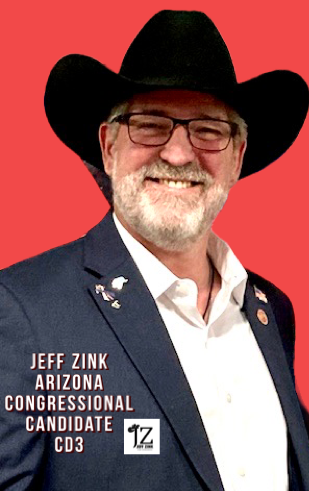He rallied in DC Jan. 6 and worked on discredited 'audit.' Now he’s running for Congress
- Oops!Something went wrong.Please try again later.
When Republican Jeff Zink ran for Congress in 2022, he lost to the incumbent Democrat by a 3-to-1 margin.
That doesn’t shake Zink’s belief the election was “stolen” from him.
Zink, who is again seeking the GOP nomination in Arizona’s bright-blue 3rd Congressional District, has built his political image as an enthusiastic participant in the Republican-led efforts to cast doubt on the integrity of U.S. elections.
His campaign platform ranges from kitchen-table issues, such as lowering gas prices and attracting economic investment to south Phoenix, to a detailed and passionate defense of a range of unfounded conspiracy theories, such as the belief that Democrats have won recent elections due to voter fraud or that certain vaccines are harmful to human health.
His chances of winning the congressional seat are next to nil. But many of Zink’s views represent those of a growing share of the Republican Party, where voters are increasingly doubtful about vaccines and inclined to believe the unfounded claim that President Joe Biden’s 2020 election win was not legitimate.

Zink himself attended the “Stop the Steal” rally in Washington, D.C., Jan. 6, 2021, before supporters of former President Donald Trump violently entered the Capitol, disrupting the election certification that was underway.
Ryan Scott Zink, Jeff Zink’s son, was convicted of a felony and two misdemeanors for his actions that day, including obstructing official proceedings and entering restricted grounds in or around the Capitol.
“We knocked down the gates! We’re storming the Capitol! You can’t stop us!” Zink’s son recorded himself saying, according to court documents.
Zink has echoed national Republicans' claims that the prosecution of Jan. 6 participants was politically motivated, writing in campaign materials that the charges against his son are a "persecution scheme coordinated by the DOJ and the Biden Administration."
Zink also worked on the Arizona Senate’s discredited “audit” of Maricopa County ballots after the 2020 election, a partisan operation that attempted to hand-count the nearly 2.1 million ballots cast. It was lengthy, a gaffe-prone process during which an Arizona Republic investigation revealed even its top leadership lost faith.
Proponents of the ballot count said it would show that Trump, not Biden, was the legitimate winner of the presidential election in Arizona. Instead, it found that Biden won by an even larger margin than county officials had originally found.
The election 'audit': Why The Arizona Republic kept fighting for the truth
Zink is proud of his involvement in the operation and says he has confidence in its findings. However, as many Trump supporters did at the time, Zink focuses on the report’s criticisms of Arizona’s election procedures, rather than the fact that it affirmed Biden’s victory.
“Did he have those numbers? Yes, he did. Were they legitimate, or valid? That we cannot attest to,” Zink said.
That mistrust extends even to Zink’s own 2022 election, which he lost in a landslide, by 77%-23%, to incumbent Democratic Rep. Ruben Gallego.
In the months after the election, Zink joined a lawsuit with the unsuccessful secretary of state candidate Mark Finchem, arguing that issues with ballot machines had undermined the integrity of the election. He dropped out of the lawsuit soon after, and Finchem’s case was dismissed.
Now, Zink raises an additional set of qualms about the 2022 vote count, arguing for example that there was no “spike” of GOP votes in his favor, as he believes should have happened. Some conservative figures had urged other Republicans to wait until Election Day to cast their vote in person.
However, the district has about three times as many registered Democrats as Republicans, according to the Maricopa County Elections Department.
“That was done to embarrass me,” he said of his massive margin of loss, dismissing the result as “a numbers game.”
As of September 2023, Zink had loaned himself $49,000 to fund his campaign and had received about $5,000 in contributions from other individuals, according to federal election records.
Zink's competitors for GOP nomination
David Mendoza is the only other Republican candidate who has registered to raise funds in the race. In an interview, Mendoza, a software engineer, emphasized his background as a Colombian immigrant and named education as his top policy priority.
Mendoza launched his campaign in November and has not yet reported any funds raised.
Five other candidates have filed a statement of interest to participate in the Republican primary: Vincent Correa III, Nicholas Glenn, King-Golden Iwangou, Calvin Lieberman and Nayel Madanat.
In the general election, the Republican nominee will likely face former state Sen. Raquel Terán or Phoenix Vice Mayor Yassamin Ansari, who have emerged as the two front-runners in the Democratic primary.
This article originally appeared on Arizona Republic: This candidate for Congress worked on discredited AZ election 'audit'
